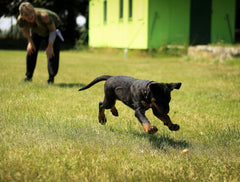
The world of food and drink isn’t the only entity making the shift from artificial ingredients to natural ingredients – this is all part of a growing trend of becoming more aware of the chemicals that we put into our bodies. For far too long, we’ve simply been consuming artificial – meaning manmade – chemicals, ingredients, and toxins through the foods that we eat and the beverages that we drink. We’ve done this all, failing to realize that all-natural ingredients can provide the same – if not more – benefits, all with stronger, richer flavors and no harmful toxins. The pet food industry has recognized this shift and is finally beginning to make the change over from artificial ingredients to natural ingredients. After all, our pets deserve to reap the same benefits that we do as humans – especially when it comes to food.
What’s The Difference Between Artificial And Natural?

When it comes down to it, the difference between artificial products and natural pet food simply comes in the form of the good ingredients used to make it! Artificial pet foods are made with artificial dyes and pigments to color the food, artificial flavors that aren’t derived from an actual food source, and artificial preservatives to keep the food from spoiling or discoloring. Natural pet foods, on the other hand, receive their color from the rich and robust family of real food ingredients that are used to make it. In addition, their flavors are a combination of tasty plant-based foods, meats, and grains, and they are completely preservative-free. The biggest takeaway from these major differences is the fact that natural pet foods are simply healthier for our pets because they don’t contain the harmful chemical additives that nearly 87% of pet owners claim they avoid.
Retailers Take Notice

Just last year, pet store giant, Petco, announced that they will be the first major pet retailer in the world to cease their sale of dog and cat products that contain any artificial colors, flavors, or preservatives. This massive shift is in line with current opinion on the matter and has certainly served as the benchmark for dog food and cat food manufacturers all around the world.
Why We Care

Petsmont is the leading voice for healthy conscious pet owners globally. Petsmont works together through networking, advocacy, and other initiatives to encourage and protect pets from unhealthy lifestyles. We want to share news about eco-friendly and all-natural items and discoveries. Teach about the positive environmental and nutritional attributes of natural ingredients products with consumers, the media, and policymakers.




